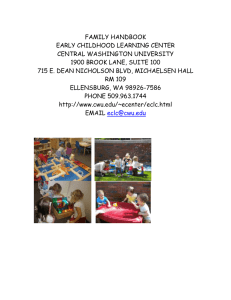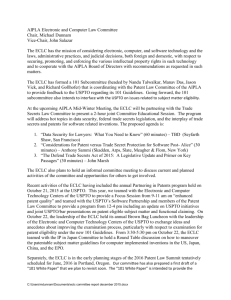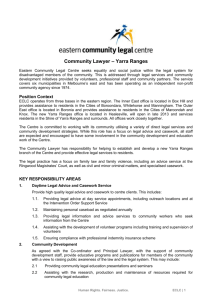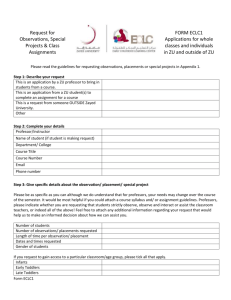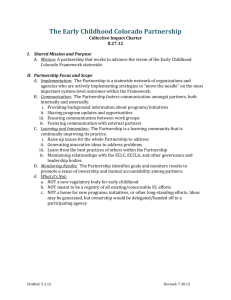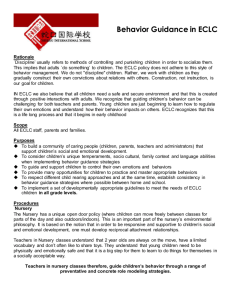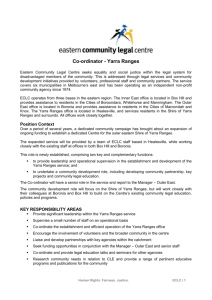PARENT HANDBOOK Fall 2013
advertisement
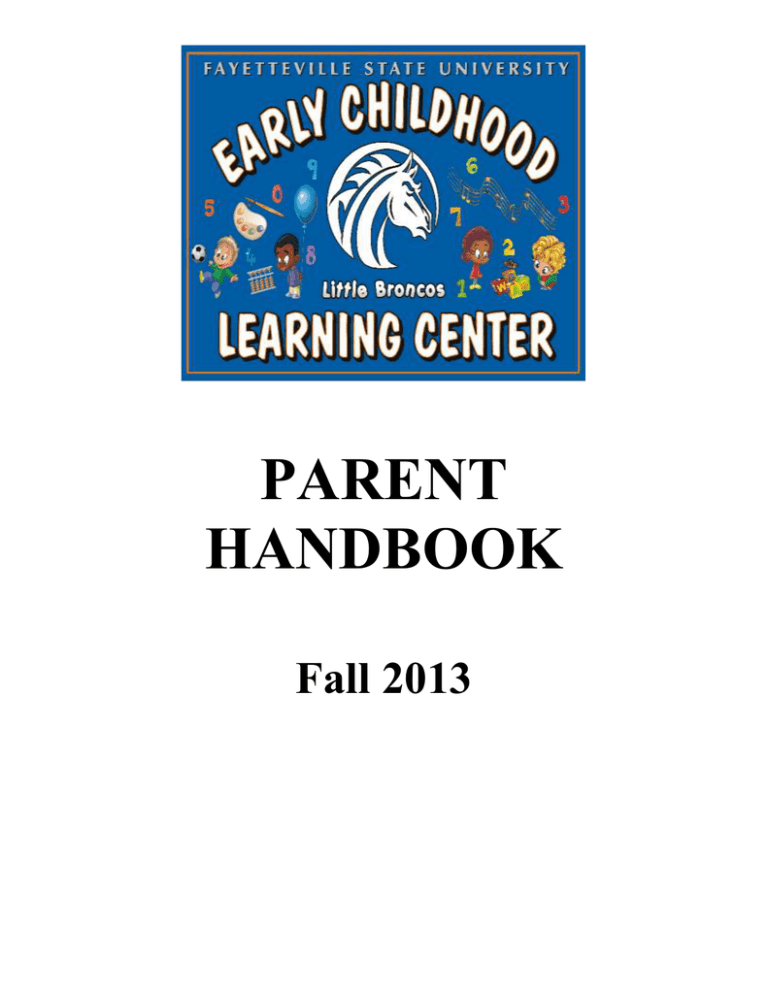
PARENT HANDBOOK Fall 2013 FAYETTEVILLE STATE UNIVERSITY EARLY CHILDHOOD LEARNING CENTER HANDBOOK TABLE OF CONTENTS Introduction………………………………………………………..……..….….. 3 Mission/Purpose….………………………………………………..………….. 3 Programs Offered……………………….……………………..………….….. 4 Religious Activities……………………………………………………………… 4 Child Care Costs……………………………………………..…..………… …… 5 Clothing……………………………………....................................... …… 6 Common Illnesses…………..……………………..….………….…………… 7-11 Discipline and Behavior Management………….………………….…… 12-13 Nutrition…………………………….……………………….……….……………… 14 Transitioning a Child to an Upper Level Class……………….………… 15 Parent/Family Engagement Log…………………………………………… 16 Parent/Family Communication Log………………………………………… 17 Parent/Family Improvement/Promise……………………………………… 18 ECLC’s Promise……………………………………………………….……………… 19 2 INTRODUCTION The Fayetteville State University Early Childhood Learning Center (ECLC) is a child development and early childhood education center serving children from birth through five years of age that is under the direction of the University’s School of Education. The ECLC was established in the fall of 1970 to provide early childhood education majors an opportunity to become familiar with young children and their characteristics and to enable the translation of theoretical concepts into practical application. In addition to being a center for the training of early childhood personnel, the ECLC also has as one of its goals to provide a learning environment that will help young children develop to their maximum potential physically, intellectually, socially and emotionally. The ECLC serves not only the University community, but the Fayetteville/Cumberland County community. MISSION/PURPOSE Our mission is to provide child care that encompasses the needs of each child and family in a safe, educational environment. We structure our Center’s focus on the individual needs of each child, while providing quality, reliable and safe child care in preparation for higher education. 3 PROGRAMS OFFERED The ECLC opens at 7:30 a.m. and closes promptly at 5:30 p.m. Teachers must be notified when a child will be arriving after 9:00 a.m. The ECLC seeks to provide a program of experience designed to attain the following goals: 1. To provide many opportunities for social development and adjustment to group living. 2. To promote development of good health habits. 3. To provide opportunities for self-expression through language, music, art, role playing, dramatizations, and other play experiences. 4. To provide an atmosphere in which a child can succeed, thus building confidence in his or her own ability and worth. 5. To provide an atmosphere in which creativity is stimulated. 6. To develop a feeling of adequacy with emphasis on independence and good work habits. 7. To lay foundations for subject matter learning and intellectual growth. RELIGIOUS ACTIVITIES Activities, instruction or communications which promote religious beliefs will not be directed toward children participating in the NC Pre-K portion of the Early Childhood Learning Center’s day. 4 CHILD CARE COSTS Registration and Tuition Costs The fees associated with registration and tuition are as follows: Registration Fee $125.00 (one time only) Monthly Childcare Fees Infants (6 weeks to 12 months) Toddlers (1 to 2 years of age) Preschoolers (3 to 5 years of age) $598.00 per month $541.00 per month $515.00 per month Before and After NC Pre-K Care 7:30 a.m. - 8:30 a.m. and 3:00 p.m.-5:30 p.m. $85.00 per week Child Pick-up Late Fees Late fees will be charged on a per family basis when parent/family fails to pick up a child by 5:35 pm. Such failure will result in an initial late fee of $10.00 and an additional $5.00 every minute thereafter, not to exceed $50.00. Charges will be made, recorded, and collected by the staff person on duty at the end of the day. After three (3) recorded late pickups within a year, the late fee will double to an initial late fee of $10.00 and an additional $10.00 for every minute thereafter, not to exceed $100.00. Continuous late pickups may result in the child’s termination from ECLC. 5 CLOTHING Clothing should encourage movement and play. Parents should ensure that a child’s clothing is: Comfortable, washable, and allows for self-dressing Appropriate for arts and crafts Because preschool children become really involved in activities, parents should not dress them in clothing that requires that they remain clean. Overalls, dresses with ruffles and bows, and pants with difficult belts and fastenings should be avoided. Shoes should be comfortable and allow for active play. Shoes that are easy to put on/take off (i.e. Velcro sneakers) are preferred. Cowboy boots are not appropriate for daily wear. All parents are urged to send 2 pairs of clothes to school. All clothing should be marked with your child’s name in a permanent marker. Please make sure your clothes are changed out seasonally. Weather Related Clothing Children will go outside most days; thus, when cold weather arrives, parents should ensure that children wear a hat, mittens and a sweater to layer over clothes. Girls who wear dresses should also wear pants or tights. When it rains, always, parents/families should ensure that their child wears a raincoat and rain boots. Umbrellas should not be given to children. 6 COMMON ILLNESSES IN CHILDREN If children come to school when they are not feeling well, they will be more vulnerable to infection. It is in best interest of a child for parents to keep the child at home when the child is ill. The ECLC staff will follow the chart below in determining how to handle a child with a certain illness: Diarrhea( 3-4 loose, watery stools in a 4 hour period) Send home immediately; child should not return until completely recovered. If the child returns to the ECLC after being sent home on the previous day, one loose, watery movement will require that the child return home. Fever( temperature of 102 degrees F or more) Parent/Family will be contacted. A child will be sent home if fever is present when the child arrives. A fever in combination with other illness will require that the child be sent home. A child may not return to the ECLC after having a temperature of 102 or above until the child has been free of fever for 24 hours. A child will not be able to return to ECLC until treated; the child may return with medication; parent/family must have ears rechecked after child appears better. Ear Infections Colds Child may attend as long as the child can participate in the normal daily activities. Parent /Family is asked to keep children at home when excessive coughing, sneezing, and /or mucus are present. Parent/Family will be contacted and the child will be allowed at ECLC until treatment has begun. Child will not be allowed in a pool. Ringworm Chickenpox Parent/Family will be contacted and the child will not be allowed to attend ECLC until all lesions are scabbed. Parents/Families of classmates will be informed. Group A Streptococcal Disease A) Impetigo B) Streptococcal (sore throat) C) Scarlet Fever (strep throat) Parent/Family will be contacted and the child will not be allowed to attend ECLC until cleared by a physician. Child must have been treated 48 hours before returning to ECLC. 7 Conjunctivitis (pink eye) Child will not be allowed at ECLC during the acute stage. Scabies Parent/Family will be notified and child will not be allowed at ECLC until 24 hours following treatment. Contacts will be checked for scabies and child will not be able to attend ECLC until treatment has begun. Parents/Families will be notified and the child will not be allowed at ECLC for 9 days after onset of rash or until completely recovered. Parents / Families of other children will be notified to check the status of their child’s immunizations. Measles; Rubella (German Measles) Parasites Bed Bugs The most common signs of bed bugs are small, flat, or raised bumps on the skin, redness, swelling, and itching. Parents/Families should notify ECLC if they suspect a child has been bitten by bed bugs. The child will not be allowed to return until the parent/family provides evidence from an insect terminating company that the home has been exterminated and the problem no longer exists. The most common signs of head lice are a tickling feeling of something moving in the hair; itching (caused by the allergic reaction to the bites); and sores on the head (caused by scratching). Sores on the head can sometimes become infected causing the child to become irritable Head Lice Families should notify ECLC if they suspect that their child has head lice. The child will be allowed to come to the ECLC and will not be able to return until a physician provides documentation stating that the child no longer has head lice. 8 BASIC DIABETES Teachers will receive knowledge about basic diabetes. Teachers and Families will be provided the NC Division of Child Development and Early Education’s Diabetes Action Plan in Center’s handbook. The Diabetes Action Plan gives directions and instructions to accommodate these children; where their blood glucose should be aimed and insulin instructions. The plan also gives families input for snacks and meals timing. Teachers will provide a classroom environment to accommodate children with chronic illnesses. The NC division of Child Development and Early Education Diabetes Action Plan will be paced in the Fayetteville State University Early Childhood Learning Center’s Parent Handbook. Teachers will not need to be certified in these areas. 9 10 11 DISCIPLINE AND BEHAVIOR MANAGEMENT Praise and positive reinforcement are effective methods of the behavior management of children. When children receive positive, non-violent, and understanding interactions from adults and others, they develop good self-concepts, problem-solving abilities, and selfdiscipline. Based on this belief of how children learn and develop values, the ECLC will practice the following discipline and behavior management policy. WE: WE: DO praise, reward, and encourage the children. DO NOT spank, shake, bite, pinch, push, pull, slap, or otherwise physically punish the children. DO NOT make fun of, yell at, threaten, make sarcastic remarks about, use profanity, or otherwise verbally abuse the children. DO NOT shame or punish the children when bathroom accidents occur. DO NOT deny food or rest as punishment DO reason with and set limits for the children. DO model appropriate behavior for the children. DO modify the classroom environment to attempt to prevent problems before they occur. DO listen to the children. DO provide alternatives for inappropriate behavior to the children. DO provide the children with natural and logical consequences of their behavior. DO treat the children as people and respect their needs, desires, and feelings. DO ignore minor misbehaviors. DO NOT relate discipline to eating, resting, or sleeping. DO NOT leave the children alone, unattended, or without supervision. DO NOT place children in locked rooms, closets, or boxed as punishment. DO NOT allow discipline of children by children. DO NOT criticize, make fun of, or otherwise belittle children’s parents, families, or ethnic groups. DO explain things to children on their levels. DO use short supervised periods of “time-out” DO stay consistent in our behavior management program. 12 “TIME – OUT” “Time-out “is the removal of a child for a short period of time (3 to 5 minutes) from a situation in which the child is misbehaving and has not responded to other discipline techniques. The “timeout” space, usually chair, isTO located away from classroom activity but within the teacher’s STEPSaTAKEN IMPROVE/ELIMINATE INAPPROPRIATE BEHAVIOR sight. During “time-out,” the child has a chance to think about the misbehavior which led to his/her removal from the group. After aGeneral brief interval of no more than 5 minutes, the teacher Misconduct discusses the incident and appropriate behavior with the child. When the child returns to the general misconduct the with following will occur: group,For theincidents incident isofover and the child is treated same affection and respect shown the other children. Step 1: Step 2: Step 3: Step 4: Step 5: Conference between parent/family and teacher. Conference between parent/family, teacher, and director. Find outside resources to assist child with redirecting their inappropriate behavior. Suspension up to 5 days or more. The child will be dismissed from the program if all of the following steps have been unsuccessful. Biting Biting is a natural developmental stage that many children go through. It is usually a temporary condition that is most common between thirteen and twenty-four months of age. The safety of the children at the center is our primary concern. ECLC's biting policy addresses the actions the staff will take if a biting incident occurs. Step 1: Step 2: Step 3: Parent/Family /Teacher conference If the skin is broken/bruised, parent will be notified to pick up the child and child cannot return the next school day. Child will be dismissed from the program after the third offense. Weapon If a child brings a weapon or any other type of inappropriate item, e.g. cigarette lighters, matches, etc. to ECLC, the child will be automatically dismissed from the program. 13 NUTRITION The ECLC cafeteria staff prepares a breakfast, lunch, and snack for all children Food allergies and special dietary needs should be discussed with the child’s teacher and the cafeteria manager. Children with special dietary needs should have their food prepared at daily at home daily. Parents should follow the basic four food groups in order to ensure that their child receives proper nutrition. Teachers are not allowed to cook, re-heat or prepare food in the classroom. Meals are served at the following times: Breakfast - 8:30 a.m. – 9:00 a.m. Lunch - 11:00 a.m. – 11:30 a.m. Snack - 1:45 p.m. for NC Pre-k leaving for the day 3:00 p.m. for all other children Families should notify their child’s teacher no later than 9:00 a.m. when they expect their child to be late for lunch. . 14 TRANSITIONING A CHILD TO AN UPPER LEVEL CLASS Transitioning Infants to Toddler Class The ECLC will gradually transition infants to toddler room based upon the following: the child is able to eat solid foods, the child is able to feed him or herself, the child is able to drink from a cup, the child is able to walk around without assistance, the child is able to sleep on a cot, and the child is taking only one nap. Transitioning to a toddler room should occur between the ages of 22-38 months, although emphasis will be placed on development more than age. Transitioning for a couple of hours a day may occur as early as 22 months. Transitioning 36 Month-Old Toddlers to 3-4 Year-Old Class The ECLC will transition 36 month-old toddlers for one week after the 3rd birthday or the week of the 3rd birthday to a 3-4 year old class based upon the following: the child is potty trained and wearing underwear, and the child is able to adjust to an environment with more structured interactions Such transitioning shall consist of the toddler visiting the class for a number of hours in the morning Monday – Thursday and the toddler remaining in the class the entire day on Friday. 15 FAMILY ENGAGEMENT LOG August Parenting and Transitioning Help (P.A.T.H.) Training Open House September National Grandparents’ Day Autumn/Fall Begins October Columbus Day Pumpkin Patch Fall Fun Day Halloween November Veteran’s Day Thanksgiving Re-enactment of the 1st Thanksgiving December Winter Begins Christmas Christmas Celebration Around the World January Martin Luther King’s Day February Ground Hog Day Black History Contest Valentine’s Day King and Queen of Hearts Presidents’ Day March Spring Begins Spring Fling Book Fair April Easter Earth Day Spaghetti Dinner May Mother’s Day Armed Forces Day June NC Pre-K Graduation Flag Day Father’s Day Summer Begins 16 17 Parent/Family’s Promise… It is important that parents/families and ECLC staff work together to insure the best possible experience for each child. Parents/Families are encouraged to take part in school activities, such as: Attending PTA Meetings Assisting and participating with field trips Participating in PTA fundraisers Helping with classroom activities Attending parent/family/ teacher conferences Parents/Families can also help their child by doing the following: Checking their child’s book bag daily Reading all memos posted in and outside the classroom Reading all email messages sent Making sure the child attends school daily Talking with the child’s teacher frequently Keeping the child’s teacher informed with all changes in the home environment Asking the child about their day at school 18 ECLC’S PROMISE… We promise to provide a safe, nurturing and learning environment in which your child will develop to their maximum potential. 19
